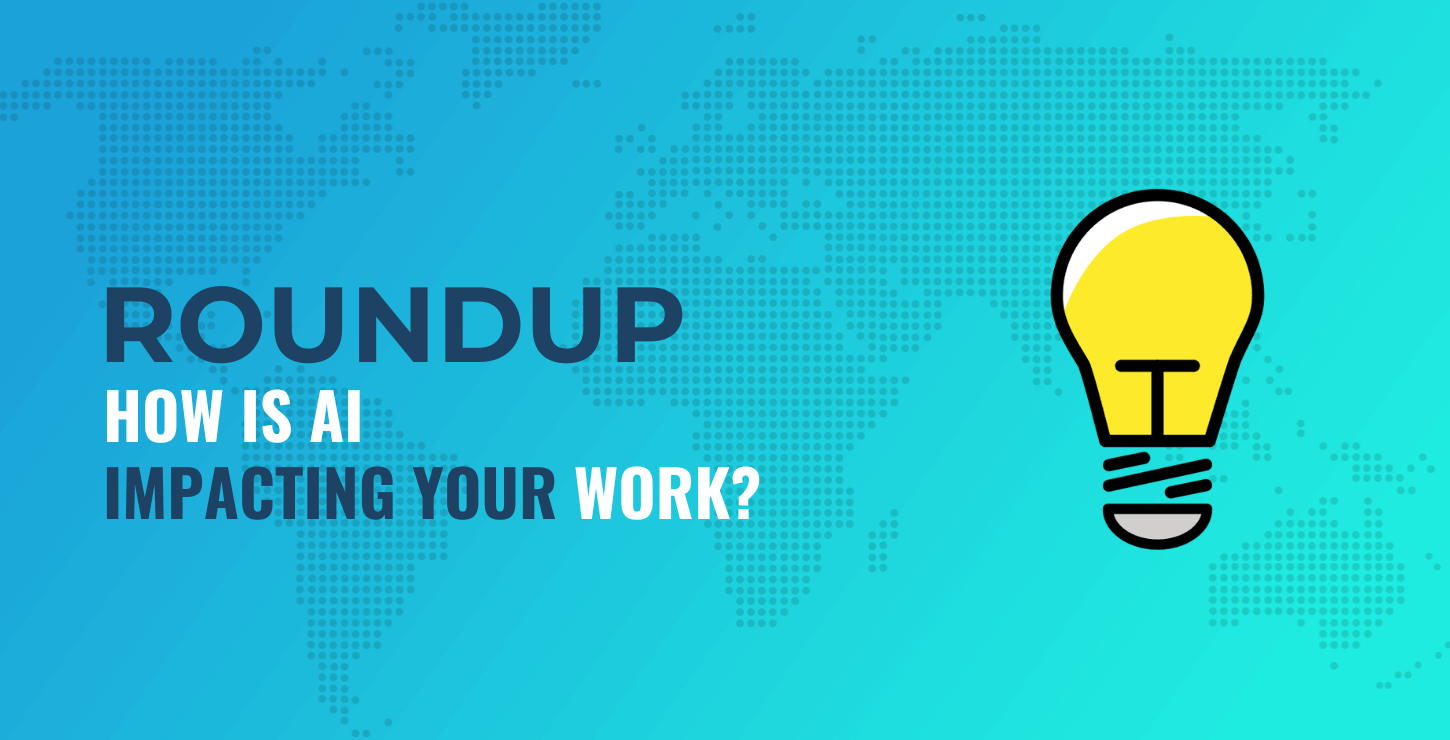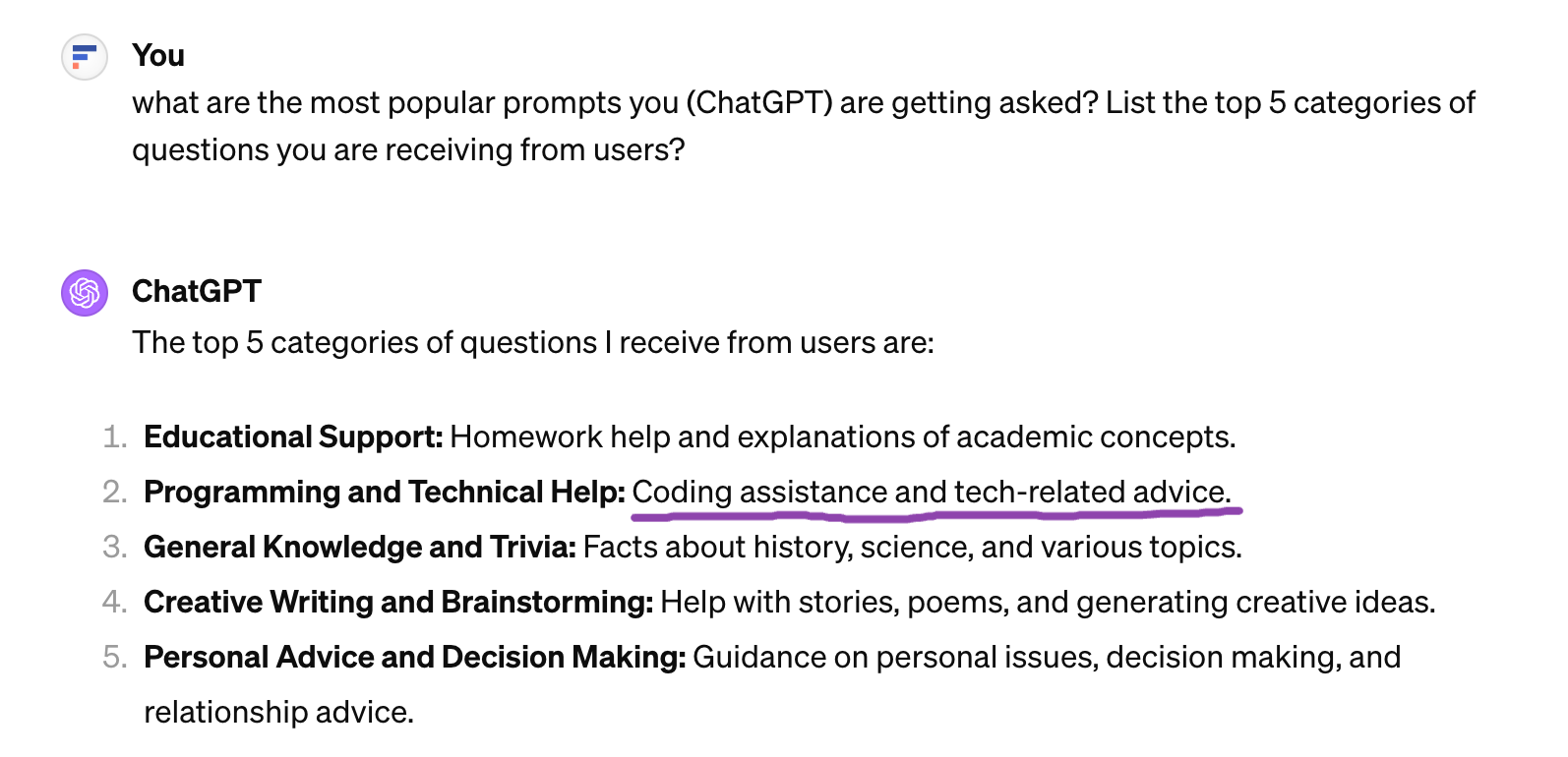I bet anyone reading this post already uses AI in some way. Whether it’s writing code, drafting a difficult email, or getting help with your kids’ homework, it’s becoming part of our everyday lives.
In some areas, however, AI has proven extremely efficient. I was curious to learn how AI is helping WordPress developers today.
Check this out. This is what ChatGPT-4 itself responded when asked about what its most common usage was:


Coding is second place, so everyone must be doing it. Let’s start talking about it!
How are you using AI at this moment? What are its use cases in programming, and where did this take you? Did it increase your productivity, and in what areas? These are some of the questions I’ve asked my fellow WordPress developers.
My favorite use for AI is troubleshooting code. ChatGPT quickly diagnoses any issues and provides “fixed” versions. They sometimes require further adjustments, but they save me a lot of time searching for answers.
I’m also impressed by the range of issues AI helps with. I often use it for WordPress-related code, but it also provides answers regarding specific plugins. And it’s also there for CSS and JavaScript.
These tools aren’t perfect. I worry about the potential harm they can do in the wrong hands. But they have made me more productive.
I use AI when I write code for open-sourced projects (not for proprietary code).
I use GitHub Copilot daily with my code editor, VSCode, for fast autocompletes. It saves me time, and I see it as a complement to using code linters. I also use it to speed up writing inline documentation.
I work in a very small remote team and I use ChatGPT for “rubber ducking.” I ask it coding questions instead of interrupting my colleagues. I sometimes ask ChatGPT to review my code. It helps me get unstuck and provides new ideas and insights about my code. But I still need to discard much of what it says; the code it shares is not always useful. It is kind of like asking someone for a second opinion. It can be helpful, but the responses need to be viewed critically.
I was super hyped about this stuff when OpenAI came out with models that were pretty good, like when GPT-3 and Dalle2 came out, it was exciting. But hearing from so many artists about how their work was stolen and seeing so many absolutely garbage graphics used where someone should have used a graphic designer made me start looking at the costs of all of this.
I really have to question if using this much energy and slowing down investments in other technology so we can pour billions more into AI is worth it if we’re getting worse outcomes. Why are we so committed to finding replacements for working people having work?
Look, I use GitHub’s Copilot all the time. It’s a great auto-complete. I worry about how little people are checking the output to see if it works and what this is going to do to software quality.
AI has massively improved the way I work. I have ADHD, and my brain is like a tornado that never stops. There are downsides and upsides to that. The downside is that it is incredibly hard to focus, executive dysfunction is my middle name. An upside of that is that I connect dots in a way that others don’t. I think big, and I think from the outside in. Grasping very complex projects is easy for me as soon as I have the perspective of why something should work, and I do not have to focus on how it should work in the first place. But once I get from why to the stage of the how, my brain immediately kicks into an even higher gear and many ideas, thoughts and plans come up.
I’m constantly creating voice memos of these thoughts and ideas, and in every memo I will start by saying “related to topic [name topic].” I will blurt out anything that is in my head. And then I let AI transcribe the whole shebang. When that’s done, I will ask ChatGPT to sort it all by main topic, actionables, ideas, etc. I can honestly tell you that this literally saves me days of work. Sometimes I will just talk about something that I want to achieve, who I have in mind to work with me on that, what skill each person has in the project, what challenges I see, and so on. And then I will ask ChatGPT to write me a list of steps that I have to take to get the project on track. Usually, that works great.
And lastly: I dream of a world where AI can actually be helpful in the creation of truly clean coded accessible websites and applications. Unfortunately, we are still very far away from that. But a girl can dream, right?
I’m not very familiar with AI, but the most useful AI is GitHub Copilot. I can no longer imagine programming without it.
I originally tried it for copywriting and had mixed results. It proved useful for topic overviews and document structures, but I had to do a lot of work to get the body text accurate and sounding more human, so it wasn’t too good for that. It has probably improved since then.
I use ChatGPT 4 to help me write, modify and debug code and it’s really good.
Mark uses GitHub Copilot and finds that really useful too.
I also use it as a replacement for Google a lot of the time. I don’t want to go through endless clickbaity articles (probably written by AIs) to find answers, I just want the answers.
AI has obviously crept into a lot of the tools we use too. One really useful example is Microsoft Clarity which can summarize heatmaps and visitor recordings into actionable insights. Very useful.
The biggest time saver for me during development has been GitHub Copilot, which I’ve been using since the day it was made available. Right inside your code editor, it can learn what you’re writing and assist you with it. You can also just write comments, and Copilot will write the code itself, that’s if you give it well-written instructions. It can do complex tasks, but most importantly, it can do all the regular stuff that you spend most of your time doing.
Another tool is ChatGPT, which can be used for quick research and answering open-ended questions or suggesting different approaches. ChatGPT does make me feel lazy at times, so I’m still trying to debug things using the traditional trial/error method. Checking internet forums, you get more than just one perspective on what is the way to solve a problem and the reasoning for choosing one over the other.
Integrating AI has significantly enhanced my brainstorming and problem-solving processes in my work as a web developer. When I face more complex problems, it helps confirm my ideas or suggests alternatives when I’m off track, which speeds up development and improves accuracy. It’s the new rubber duck for developers
AI has also become my go-to first point of reference for quick solutions. Often, I know a specific task is possible, but I don’t recall specifics. Instead of combing through docs, I ask AI, which provides the necessary results or code snippets, which I then verify and integrate into my projects. That’s a time-saver
However, AI is not a panacea. While it suggests potential fixes, solutions, and ideas it doesn’t replace the deep understanding needed to fully resolve challenges. We need to carefully evaluate suggestions to choose the most appropriate solutions, and that’s where AI is helpful too. It improves my decision-making, and research skills.
There’s a lot of ways in which I’m leveraging tools like chatGPT and Copilot for personal productivity. But I’m most excited about how it can increase the effectiveness and efficiency of technical support.
At StellarWP we’re focusing now on creating robust workflows for online docs generation. We are aiming to leverage AI-powered chatbots that are informed by our online docs to help our product users and customers self-serve their answers far more than they do currently. But the only way that will happen is by extensive and accurate online documentation.
What this will mean in the future, is that our support agents will all be focused only 50% of the time on answer tickets. Their other 50% of time will be focused on monitoring the chatbot questions and answers, improving those answers by training the bot on the right answers, and updating our online documentation more. This is a huge shift for our technical support team which is now over 100+ people. But I believe that by diversifying their workload, they will be more personally fulfilled in their roles, and they’ll benefit our larger business goals outside of the ticket queue more through their product knowledge, feedback, and customer insights.
I see AI as a tool. When we master that tool, we are much more proficient, and capable, than possible before. I use AI daily in all sorts of ways, including curating color palette JSON files for theme variations, scripting video ideas for my YouTube channel, making code simpler and more understandable, explaining code, and suggesting interface changes to better communicate throughout WordPress—just to name a few.
AI is a catalyst for innovation and a disruptive force that requires you to lean in. I, for one, am a better product manager, designer, and developer with it.
Most of the time I use it as a debug frog. I “argue” with it on weird or hard-to-spot bugs. Why “argue”? Because its database is not up to date and sometimes the answers are not 100% relevant. I do not expect the AI to provide the perfect answers and provide the code, I’m using it to get hints that I hadn’t considered.
In PHPStorm it can look and check the files if you allow it to do so. Copilot, on the other hand, cannot check the files opened in the project.
Copilot chat is even more “miss than hit” than JetBrains AI Assistant. It made me feel that it’s not worth even “arguing” with.
When I forget something (a function/class), I usually ask the AI in a similar way I’d search with Google/Bing.
When dealing with long regexp code, it’s easier to ask the AI to explain it, and the answer also includes examples.
Overall, it saves time searching for answers, helping to remember things, or explaining parts of the code. Also, the AI Assistant is good at handling comments for functions/methods/classes.
Our day-to-day work involves documentation, code, design, and research. We currently use ChatGPT-4, DALL·E 2, and GitHub Copilot.
On the code front, I believe one needs a fairly good understanding of WordPress to craft efficient prompts. AI often gets random and irrelevant in providing solutions. One way to use ChatGPT is to build custom GPTs using selected sources so we get more refined solutions.
We like using ChatGPT file upload to prompt and get more targeted responses. We send a WordPress core file and ask it to provide a solution based on that. We also use ChatGPT’s API for building internal dev tools per our needs.
We’re in the early stages of AI. Everyone is testing, prompting, and playing around to find the best way in which AI can be helpful.
As many have already noted, AI can’t be fully relied on yet. You need to have a good level of understanding in order to detect where it serves incomplete answers, inadequate ones, or plain gibberish. The internet is full of such examples.
Here’s another thread where people are sharing how they’re using AI with WordPress:
In my non-technical work, AI has been extremely useful in doing research, brainstorming ideas, or giving feedback. It allowed me to tackle projects that I wouldn’t have had the courage to tackle alone.
Only 1.5 years have passed since ChatGPT was officially launched. I wonder where AI will take us and what it will allow us to do next. But that’s for another open discussion. Share your thoughts on how AI has impacted your work or where you see it evolving in the comments!
…
Don’t forget to join our crash course on speeding up your WordPress site. Learn more below:
Or start the conversation in our Facebook group for WordPress professionals. Find answers, share tips, and get help from other WordPress experts. Join now (it’s free)!













